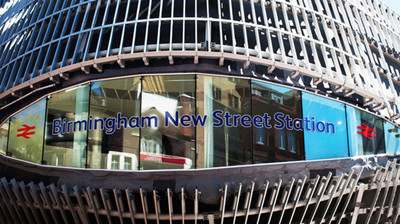中英文本
Urban planning
城市规划
Rail ambition
铁路大设想
Cities used to think modern art could save them.Now it's railway stations
城市的救命稻草由过去的现代艺术转为地铁车站
IN JANUARY commuters voted Birmingham NewStreet one of Britain's worst railway stations. Each day nearly 150,000 people move through astructure built for half as many. But by next year it will be transformed, with 400 tonnes ofundulating steel cladding and a vaguely eyeball appearance. The station will have “the wowfactor”, boasts Sir Albert Bore, the leader of Birmingham city council. It will also show howmuch attitudes to railway stations have changed.
今年1月,英国上班族的投票结果显示伯明翰新街火车站是全英最差的火车站。每天都有15万人都要去挤这个容量只有人流量一半的车站上下班。但明年,情况将有所改善—车站将使用400顿的包钢材料,带给人们一种模糊的视觉体验。伯明翰市长Albert Bore夸耀说,这个车站将会使走过路过的人情不自禁的叫出声来,使乘客对火车站的态度实现360度大转弯。

Railway stations are the chief exception to the rule that Britain invests too little ininfrastructure. Of the 17 big termini managed by Network Rail, the owner of Britain's tracks, 11are being redeveloped or have recently been completed. Five other stations, including Readingand Northampton, are being spruced up by local councils and Network Rail.
英国向来对基础设施的投资就少,但火车站则是一个例外。英国铁道所有者铁路网管理的17个火车站中,有11个使乘客对火车站的态度实现360度大转弯,还有5个(包括雷丁火车站和北安普顿火车站)由当地政府和铁路局负责翻新修理。
Some simply need to be expanded: the number of train journeys has risen by 35% since 2005.But the design of New Street suggests aspirations well beyond more easeful travel. The buildingwould not look out of place in Dubai and is striking, if slightly incongruous, in the grey WestMidlands. City planners wanted something monumental, like Grand Central station in New York,says Sir Bernard Zissman, chairman of the independent design panel.
有一些则只需要扩建:自2005年起,搭乘火车旅行的人次上升了35%。但是新街火车站的设计表明,改良的初衷不仅仅是为了实现提供“更舒适的旅行”这一基本目的。这种独特亮眼的建筑出现在迪拜很合适,但是在灰蒙蒙的西米德兰兹郡,就有那么点不合时宜了。城市规划者、独立设计小组主席Bernard Zissman解释说想建一些地标性的建筑物,就像纽约的中央车站一样。
“Twenty or thirty years ago business people were more likely to arrive in a city by car,” explainsJon Neale of Jones Lang LaSalle, a property specialist. Town planners duly carved outmotorways and roundabouts to entice them. In 1962 a local politician claimed that a newdesign for Birmingham, involving an inner ring road, would make it “one of the finest citycentres in Europe”.
仲量联行的房地产专家Jon Neale说,二三十年以前,商人们大多数情况下都会坐车,因为城市规划者不失时宜地开发了很多高速公路和环状交叉路口诱惑他们。1962年,一位当地政客称会在伯明翰开始新的城市规划,包括建设一条内环路,使其成为“欧洲最好的市中心之一”。
Cities now measure their appeal by their stations. Businesses cluster around them: at King'sCross, a once-grimy part of north London, a postcode has been created for all the newbuildings around the station, which was redeveloped in 2013. John Lewis, an upmarketdepartment store, will open in the mall above New Street (which is indeed called “GrandCentral”) along with 60 other shops. The council hopes it will pull in visitors to the city.
当今很多城市都用他们的火车站衡量城市魅力。车站附近也建起了商业圈:英国王十字车站曾是北伦敦一个污秽不堪的地方,2013年重建后,所有车站周围的新建筑都被赋予了一个新的邮编。高档百货公司John Lewis将会在新街车站上面开一家商城(命名为“中央车站”)以及60家商店。市政当局希望这会吸引更多游客。
Such ambition recalls the stations of the 19th century. Those structures “spoke to thecorporate sensibility of a city,” says Tristram Hunt, an MP and historian, by combiningcommerce with the sheen of civic pride. The first New Street station, built in 1851, had thelargest single-span roof in the country at the time. It was torn down by enthusiastic 1960stown planners. Now some of its original lustre may return.
这样宏大的构想让人想起了19世纪的车站。历史学家兼国会议员Tristram Hunt说,那些建筑结合了商业贸易和公民自豪感,向企业家们诉说着城市的点滴与沉淀。1851年修建的第一个新街火车站有那个时代最大的单拱桥屋顶。20世纪60年代,狂热的城市规划者将它拆掉。而现在,那些原先的光辉可能重返
重点讲解
1.railway station 火车站
例句:The 'customs house is near the railwaystation.
海关离火车站很近。
2.need to 需要
例句:Most people recognise the need to pay agolden hello to attract the best.
大多数人都认识到需要用高额聘金来吸引精英人才。
3.likely to 可能
例句:This is likely to revive consumer spending and a whole raft of consumer industries.
这可能会带动消费性支出和一大批消费工业的复苏。
4.arrive in 到达
例句:Can we arrive in Beijing on time or not?
我们能否按时到达北京?
更多热点资讯欢迎关注:
新浪官方微博:@北京诚品一诺教育咨询
http://weibo.com/yinuoedu
微信订阅号:留学圈 (微信帐号:yinuoliuxue )

姓名:周小芳
版权所有@2012-2016 一诺留学网 京ICP备12034294号-1
联系电话:400-003-6508 010-62680991 传真:010-82483329 邮箱:service.bj@yinuoedu.net